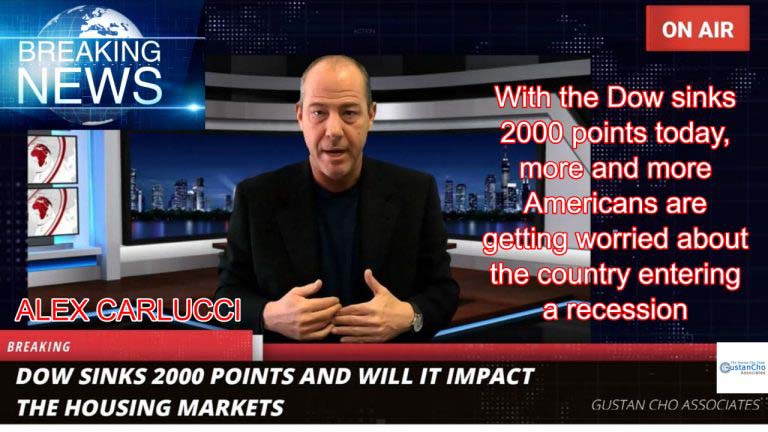Most lenders increased minimum credit score requirements to 660 to 680 FICO on FHA loans. Many increased minimum credit score requirements on VA loans to 640 to 680 FICO. Other major lenders like JP Morgan Chase have stopped doing government loans. Chase Mortgage now only accepts conventional loans for borrowers with at least a 700 FICO and 20% down payment. JP Mortgage Chase no longer does FHA, VA, USDA loans due to The Coronavirus Mortgage Meltdown. The good news is Gustan Cho Associates has not increased lender overlays. It is business as usual at Gustan Cho Associates. We still take FHA loan applications with credit scores down to 500 FICO and have no minimum credit score requirements on VA loans.
The Coronavirus Mortgage Meltdown Versus 2008 Financial Crisis
It is yet too early to tell the extent of the damage in the real estate and mortgage industries from The Coronavirus Mortgage Meltdown. If the federal government does not intervene and bail out mortgage servicers, we can see The Coronavirus Mortgage Meltdown become worse than the mortgage crash of 2008. Although mortgage rates are historic lows, this is for prime borrowers only. A prime borrower is a mortgage borrower with at least 740 credit scores and has a 20% down payment on a conventional single-family home purchase. Prime borrowers can get the best rates today than ever before. However, those with under 700 credit scores will most likely get high rates and be charged discount points.
What is the reasoning behind this? Liquidity issues on the secondary mortgage bond markets. There is absolutely no demand on the secondary market for investors on mortgage-backed securities (MBS) for borrowers with under 700 credit scores. Due to liquidity issues on the secondary mortgage bond markets, borrowers are having a hard time approving loans for borrowers with lower credit profiles. The FHFA announced last week both Fannie Mae and Freddie Mac will be buying mortgages in forbearance. This news was a great relief for mortgage servicers. The CARES Act allows financially stressed homeowners to skip mortgage payments for six months and can get an extension for up to one year. However, mortgage servicers still need to pay investors even though borrowers are not paying them. Servicers also need to pay property taxes and homeowners insurance on borrowers with escrow accounts.
How The Mortgage Process Works
In this paragraph, we will discuss the mortgage process in detail:
- A consumer interested in qualifying for a mortgage goes to a lender
- A loan officer is assigned to the borrower
- The loan officer will qualify and approve the borrower
- The loan originator will quarterback the loan transaction all the way through the mortgage closing
- Once the mortgage loan is closed, the loan is then transferred and assigned to a mortgage servicer
- The mortgage servicer can be the same lender who originated and funded the loan and/or be a third-party mortgage servicing company
- The servicer will notify the borrower and introduce themselves as the mortgage servicer
- The role of the servicer is to send out mortgage statements and collect payments from borrowers
- Mortgage servicers do not own the mortgage loan
The job of a mortgage servicer is to simply handle and maintain the mortgage loan.
Duties And Role Of Mortgage Servicers
Mortgage servicers do the following functions:
- Send out billing statements to borrowers including escrow statements
- Collect payments from borrowers
- Process borrower’s monthly payments of borrowers
- Forward payments to the investor of the mortgages
- Pay property taxes and homeowners insurance from the escrow account
- Take borrowers calls and answer them
- Perform other duties such as preparing payoffs and other duties
CARES Act And How It Can Trigger The Coronavirus Mortgage Meltdown
Servicers do not own the loan they service. The mortgage loan is sold to an aggregator and/or to a government agency such as Fannie Mae, Freddie Mac, or Ginnie Mae. The individual loans the mortgage servicer takes care of are part of a bundle of loans that is part of mortgage security called mortgage-backed securities. Mortgage-backed securities, commonly referred to as MBS, are then sold to the public market such as Mutual Funds, Retirement and Pension Plans, and Insurance Investment Funds.
The end investor still expects monthly payments from the mortgage servicer. This holds true whether or not the borrower pays the servicer. This can crush the mortgage market if a substantial of homeowners have their mortgage in forbearance under the CARES Act. As mentioned earlier, the impact of The Coronavirus Mortgage Meltdown is yet to be seen. Regardless, mortgage servicers will need a federal bailout if substantial borrowers are getting their mortgages in forbearance.
How Do Mortgage Servicers Make Money
Mortgage servicing is a big business. Servicers have an important role in the mortgage industry. To obtain servicing rights by investors, the mortgage servicer normally pays a fee of 1.0% upfront of the mortgage loan amount. This fee is paid upfront before the servicer starts servicing the loan. The reward of the servicer is a monthly fee of the amount of loan it services.
The monthly fee the servicer receives is called a strip. In most cases, the servicer will receive around 30 basis points annually. To get the servicing rights, the mortgage servicer pays a 1% upfront fee of the loan amount. Then they get an annual income of 30 basis points. So the breakeven point is around 36 months for the mortgage servicer to recover their investment cost. Any money that comes in after the breakeven period is profits. The longer the servicer maintains and services the loan, the more money they make. The initial cost can be paid in full or the servicer may want to margin it. What this means is to finance a portion of the upfront fee to get more leverage. Most servicers will come up with 50% in cash and finance the balance.
How Mortgage Servicers Lose Money
As mentioned in the above paragraph, the mortgage servicer gets servicing rights by paying an upfront cost of 1% to the investor to retain the servicing rights for their mortgage portfolio. In return, the servicer makes 30 basis points per year of the loan amount in the servicing portfolio. It normally takes three years to break even on an average loan. However, when mortgage rates drop, homeowners refinance to get a better mortgage rate. When borrowers in a servicer’s mortgage portfolio refinance, it means they pay off the loan balance.
If the borrower pays off the mortgage balance prior to the servicer’s break-even period, this means the servicer did not recoup their initial investment for the cost to maintain and service the loan. This results in a loss to the mortgage servicer. However, taking losses from borrowers refinancing is the cost of doing business for servicers. The more loans that is being refinanced means the greater the loss to the servicer. If there is a flood of refinances, there is a servicing runoff that affects the market valuation of a servicing portfolio. However, the loss is overcome by new loans the servicer brings on due to lower mortgage rates. So the new loans the servicer has taken in on a refinance boom will offset the losses taken due to losing refinances on the loan that has not reached its 3-year break-even period.
The Potential Negative Impact On The U.S. Economy Due To The Coronavirus Mortgage Meltdown
The COVID-19 pandemic has not only caused a complete shutdown of the U.S. economy but turned the once-thriving mortgage markets into complete turmoil and chaos. Literally, the thriving and booming non-QM mortgage markets came crashing down. All non-QM lending has completely stopped. Many non-QM lenders have gone bankrupt. Over 39 million Americans have filed unemployment claims in the past 8 weeks. Millions of businesses have closed and a large percentage of them will not reopen. With an astounding number of unemployed Americans, this will create difficulty for homeowners to be able to pay their mortgage payments which will affect servicers. A large number of homeowners are expected to take advantage of the government’s forbearance plan.
Mortgage servicers are still on the hook to pay investors. Servicers also need to pay property taxes and insurance for borrowers who have escrow accounts. This holds true even though they get no payments from borrowers under the CARES ACT forbearance program. Under normal economic circumstances, servicers have enough reserves to handle forbearance mortgages. However, if a flood of borrowers is getting forbearance on their mortgages, it may bankruptcy mortgage servicers unless they get a bailout from the federal government.
Flood Of Forbearance Requests From Homeowners
Nobody knows the actual number of forbearance requests from homeowners yet. However, many experts and economists expect to be in the double digits. Some sources even estimate that as many as 25% of all homeowners who hold federally-backed mortgages may take advantage of the federal mortgage forbearance program under the CARES Act. Under the CARES Act, unemployed homeowners can get a forbearance if they have a federally-backed mortgage. FHA, VA, USDA, Fannie Mae, and Freddie Mac are all federally-backed mortgages. If a large percentage of homeowners take advantage of the federal forbearance program, it can create major financial obstacles for servicers. Mortgage servicers are still obligated to pay investors’ mortgage payments even though the borrower is under forbearance.
What Mortgage And Real Estate Economists And Analysts Are Saying
Gustan Cho Associates has been following this topic since the start of the Coronavirus Economic Collapse.
Return To Normalcy In Mortgage Rates
The mortgage industry can be complex. Many still do not understand why mortgage rates are high for borrowers with under 700 credit scores. FHA and VA Streamline Refinance is almost non-existent for borrowers with lower credit scores. Jumbo loans have been halted by many lenders due to liquidity issues in the secondary market. Non-QM loans have been suspended but a few lenders have not reopened taking non-QM mortgage applications. However, credit score requirements and down payment guidelines have increased.
The secondary bond mortgage markets still have no appetite for borrowers with under 700 credit scores. The government did its part in avoiding a major mortgage market meltdown. The FHFA announced Fannie Mae and Freddie Mac will be buying mortgages under forbearance. Many home buyers with lower credit scores are being turned down left and right because of tighter credit and debt to income ratio restrictions. The great news is there are lenders like Gustan Cho Associates that is still taking applications on FHA loans with credit scores down to 500 FICO. Gustan Cho Associates have not implemented lender overlays during the coronavirus pandemic.
Gustan Cho Associates still has no minimum credit score requirements or maximum debt to income ratios on VA loans. We still do manual underwriting on VA and FHA loans. Once the economy reopens and stabilizes, the mortgage markets are expected to return to normalcy. Mortgage rates should be in sync and return to normalcy. However, investors are scared and careful. The U.S. economy went from being the best in the history of the U.S. due to the worst due to the pandemic. The major difference between the 2020 COVID-19 Economic Crash versus the 2008 financial crisis is the government was hands-on and proactive during the pandemic. Key data and economic numbers suggest that the U.S. is poised for the fastest economic recovery in history. Americans are optimistic and have all the faith and confidence in the Trump Administration.
The Dow Jones Industrial Average, once at 29,000 in February 2020, has tanked to 18,000 but is not on the road to recovery. The Dow Jones Industrial Average has surpassed 35,000 today and is expected to make a full recovery. Mortgage loan application numbers have been increasing despite the economy just reopening. This is a developing story. We will keep our viewers at Gustan Cho Associates updated on new developments in the days and weeks to come.











